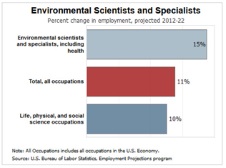Environmental management skills are in demand around the world. In New Zealand, environmental management has been given an enormous boost as a career option over the past two decades. With the introduction of some major pieces of legislation, in particular the Resource Management Act, the Hazardous Substances and New Organisms Act, and the Biosecurity Act. And there are plenty of opportunities to practice overseas, as long as you familarise yourself with the local statutory requirements.
There is now a very large environmental consulting sector, contracting to private and public sector organisations. This kind of work tends to have plenty of variety, not to mention opportunities for travel. There is always high demand in this area for graduates with a thorough understanding of the new environmental management scene backed up by specific scientific skills.
Many large companies now employ environmental management staff to work directly with their other staff, and to deal with local and central government. Those with overseas operations will need personnel with an international perspective in their training, something emphasized in the Otago course. Many export companies now need environmental accreditation in order to secure markets in Europe, Japan, North America and elsewhere. Helping companies meet the requirements of such accreditation and certification schemes will be a major employment opportunity in coming years.
Where some of our graduates have gone…
Otago graduates, especially those with postgraduate qualifications, have found employment in many fields of environmental management: from environmental consultancies to local government planning departments, from central government agencies to private sector companies. Examples include:
Cherie (BAppSc Honours, with Economics second major): NZ Environmental Protection Agency, now with an environmental consultancy.
Mark (BAppSc Honours, with PGDip Public Health): now technical adviser on drinking water quality, major district health board.
Allanah (BAppSc Honours, then MSc Environmental management): environmental scientist in the UK with major consultants, moved to senior environmental positions in NZ, now with UN agency in S Pacific.
Bryan (PGDipAppSc): resource planner, regional council.
Nicola (BAppSc Honours, then MSc Environmental management): Resource consents officer, in regional council; now Health, safety and environmental consultant, Australian consultancy.
Chris (PGdipAppSc): pollution prevention officer, regional council.
Deborah (BAppSc Honours): environmental scientist with major New Zealand consultancies, moved to Australia, now Environmental Project Manager, international energy company.
Future prospects
The New Zealand government 2014 update on job prospects identifies “Environmental scientists” as a group with strong growth prospects:

The US Bureau of Labour Statistics tell a very similar story:
“Employment of environmental scientists and specialists is projected to grow 15 percent from 2012 to 2022, faster than the average for all occupations [see diagram below]. Heightened public interest in the hazards facing the environment, as well as the increasing demands placed on the environment by population growth, is projected to spur demand for environmental scientists and specialists.
Most employment growth for environmental scientists and specialists is projected to be in private consulting firms that help clients monitor and manage environmental concerns and comply with regulations. …
More businesses are expected to consult with environmental scientists and specialists in the future to help them  minimize the impact their operations have on the environment. For example, environmental consultants help businesses to develop practices that minimize waste, prevent pollution, and conserve resources. Other environmental scientists and specialists are expected to be needed to help planners develop and construct buildings, utilities, and transportation systems that protect natural resources and limit damage to the land.”
minimize the impact their operations have on the environment. For example, environmental consultants help businesses to develop practices that minimize waste, prevent pollution, and conserve resources. Other environmental scientists and specialists are expected to be needed to help planners develop and construct buildings, utilities, and transportation systems that protect natural resources and limit damage to the land.”
(http://www.bls.gov/ooh/life-physical-and-social-science/environmental-scientists-and-specialists.htm#tab-1)